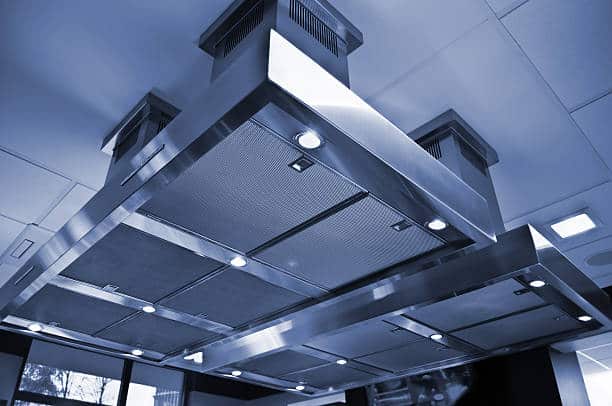Has it been a while since your kitchen hood was cleaned? Your hood vent requires cleaning services seasonally and sometimes monthly to avoid dangerous kitchen fires. Apex Hood Cleaning ensures your kitchen’s safety through rigorous, affordable commercial hood cleanings.
Kitchen Hood Cleaning Reasons
Commercial hoods often need cleaning to prevent grease from accumulating in the ductwork, which can lead to many problems.
Disease Prevention
Range hood cleanings promote good hygiene by removing grease, which attracts vermin.
Enhanced Ventilation
A kitchen exhaust hood cleaning stops lingering smoke, steam, and smells from trapped food particles from permeating your kitchen.
Code Compliance
Commercial kitchen owners who want to remain fire code compliant must uphold routine commercial hood cleanings or forfeit their business.
Reduce Insurance Premiums
Insurance companies like to reward responsible kitchen owners with a break on their rates as an incentive to keep the hood clean.
Lower Risk of Fire
Professional range hood cleaners thoroughly inspect and scour your hood, lowering the risk of kitchen fires.
Follow the NFPA Kitchen Hood Cleaning Requirements To Improve Fire Safety”
The NFPA’s (National Fire Protection Association) requires trained and certified personnel to clean restaurant kitchen hoods and exhausts on a regular basis. Their mandated cleaning schedule is as follows:
- MONTHLY – Systems serving solid fuel cooking operations
- QUARTERLY – Systems serving high-volume cooking operations such as 24-hour cooking, charbroiling, or wok cooking
- SEMIANNUALLY – Systems serving moderate-volume cooking operations
- ANNUALLY – Systems serving low-volume cooking operations, such as churches, day camps, seasonal businesses, or senior centers
According to NFPA Kitchen Hood Cleaning Requirements, “Upon inspection, if found to be contaminated with deposits from grease-laden vapors, the entire exhaust system shall be cleaned by a properly trained, qualified, and certified company or person(s)…”
In addition, ““Hoods, grease removal devices, fans, ducts, and other appurtenances shall be cleaned to remove combustible contaminants prior to surfaces becoming heavily contaminated with grease or oily sludge.”
For more information and a deeper look into requirements, you can download the “NFPA 96, Standard for Ventilation Control and Fire Protection of Commercial Cooking Operations” catalog for free on the NFPA website.
The entire exhaust system includes the hood, filters, fan, and all associated horizontal and vertical ductwork.
Knowing When to Clean Your Commercial Hood
It would be best if you clean your commercial hood when:
- You notice that your hood is not clearing smoke in the kitchen.
- Your motor is noticeably louder.
- You have been consistently cooking a high volume of dishes.
- You notice persistent odors.
- You are preparing to cook a large meal, such as Thanksgiving dinner.
How Often Should You Clean Restaurant/Commercial Hoods?
Depending on your type of hood and its frequency of use, you may need to clean your restaurant or commercial hood more often. A commercial hood or restaurant hood requires monthly cleanings to ensure the safety of both customers and kitchen staff. Some establishments that see less of a cooking rush, such as hospital kitchens, can clean their hoods every 90 days instead.
If you have a residential kitchen hood and eat take-out more than home-cooked cuisine, seasonal cleanings should be enough to keep your home safe. However, it’s always best to err on the side of caution and book frequent inspections and cleanings. Regardless of which type of hood you own, you should switch out your hood filter one to three times per month.
How to Clean Your Rangehood
You may be wondering how to clean kitchen hoods effectively to get rid of all the grease that’s accumulated. Commercial hood cleaning is a multi-step process with the following steps:
- Begin by sliding out or popping out your reusable filter.
- Use a dishwasher-safe cleaning solution and degreaser to soak the filter free of grease, unless you have a charcoal filter, in which case it will need replacing.
- Scrub and rinse the filter. Then place it back in your commercial hood.
- To clean the hood, spray on the degreaser and let it sit for about 15 minutes. Then scrub and rinse.
- Similarly, clean the vent of grease.
- Contact a professional if you cannot remove all the leftover grease within your vent.
- Use the same degreaser to clean the blower wheel.
- If your fan’s performance is still not strong, you need to look into replacing your motor.
Getting Help From the Professionals
If you need professional kitchen hood cleaning in the Pacific Northwest, look no further than Apex Hood Cleaning. Apex Hood Cleaning has over 40 years of hood cleaning experience and proudly provides cleaning services for top chain restaurants.
Whether you have a commercial or residential hood, our highly trained technicians are ready to inspect your hoods on your schedule and render your property safe to serve another fantastic array of mouthwatering dishes.
Call Apex Hood Cleaning at 877-866-3473 today!

